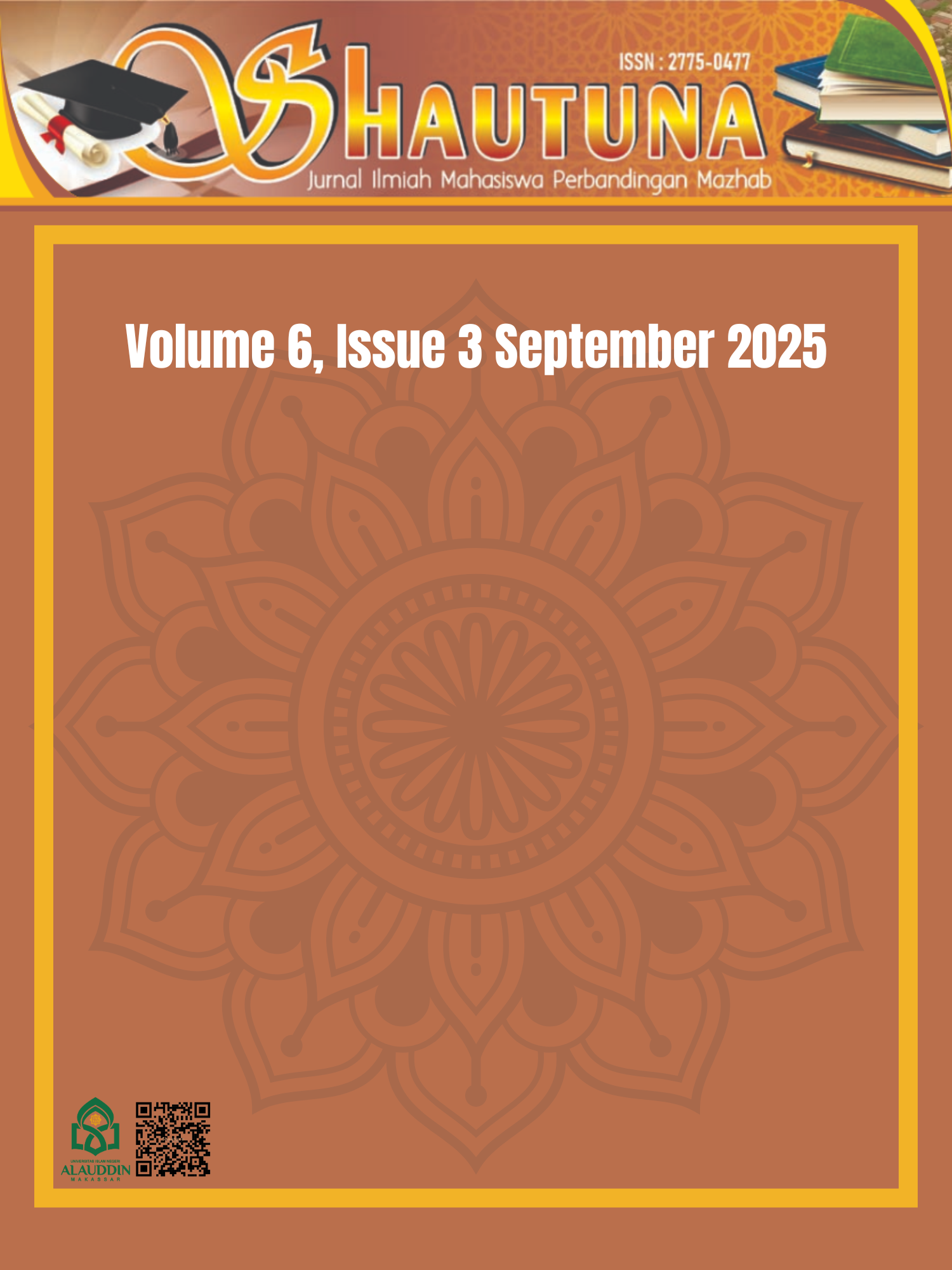Legal Liability for Contract Breaches by Online Import Proxy Shopping Service Providers
A Civil Law and Islamic Fiqh Analysis
DOI:
https://doi.org/10.24252/shautuna.v6i3.60233Keywords:
Legal Responsibility, Online Import Proxy Shopping, Civil law, Islamic JurisprudenceAbstract
The development of digital technology has given rise to the practice of online consignment services for imported goods, which makes it easier for consumers to obtain products from abroad. However, at the same time, it has also given rise to legal problems when service providers do not fulfill their obligations as agreed, such as late delivery, mismatched goods, or no delivery of goods at all. This study aims to analyze the forms of breach of contract and legal liability of online jastip service providers and to examine the legal protection mechanisms for consumers from the perspective of Indonesian civil law and Islamic jurisprudence. The research method used is normative juridical with a legislative and conceptual approach through analysis of the provisions of the Civil Code (KUHPerdata), Law Number 8 of 1999 concerning Consumer Protection, and muamalah fiqh literature regarding wakalah bil ujrah contracts. The results of the study show that in civil law, default in a jastip agreement gives consumers the right to demand fulfillment, contract cancellation, and compensation as stipulated in Articles 1233 and 1243 of the Civil Code and the Consumer Protection Law. From the perspective of Islamic jurisprudence, jastip is categorized as a wakalah bil ujrah contract that requires the principles of trust, transparency, and clarity of contract, so that when a breach of contract occurs without a valid excuse, the service provider is obliged to bear the losses (dhaman) both morally and legally. This study confirms the common ground between Indonesian civil law and Islamic jurisprudence in placing legal responsibility on business actors to protect consumer rights. Despite the existence of a clear legal basis, the practice of online proxy shopping still requires more stringent specific regulations and adequate legal education for consumers so that they can understand, demand, and effectively defend their rights in cross-border digital transactions.
References
Adinugraha, Hendri Hermawan. “Penerapan Kaidah Al-Ghunm Bi Al-Ghurm Dalam Pembiayaan Musharakah Pada Perbankan Syariah.” Economica: Jurnal Ekonomi Islam 8, no. 1 (2017): 81–102. https://doi.org/10.21580/economica.2017.8.1.1827.
Ahmad, Usamah Rievzqy. “Pemberlakuan Pajak Terhadap Barang Hasil Transaksi Jasa Titip Online.” Jurnal Suara Hukum 2, no. 1 (2020): 71–85. https://doi.org/10.26740/jsh.v2n1.p71-85.
Al-Jaziri, Abdul Rahman. Al-Fiqh ’Ala Al-Madzahib Al-Arba’ah. Kairo: Dar al-Kutub al-’Ilmiyyah, 2003.
Al-Zuhaili, Wahbah. Al-Fiqh Al-Islami Wa Adillatuhu. Jilid 4. Damaskus: Dar al-Fikr, 1989.
Auda, Jasser. Maqasid Al-Shariah as Philosophy of Islamic Law: A Systems Approach. North America: International Institute of Islamic Thought (IIIT), 2008.
Chawla, Neelam, and Basanta Kumar. “E-Commerce and Consumer Protection in India: The Emerging Trend.” Journal of Business Ethics 180, no. 2 (2022): 581–604. https://doi.org/10.1007/s10551-021-04884-3.
Elmahjub, Ezieddin. “Islamic Jurisprudence as an Ethical Discourse: An Enquiry into the Nature of Moral Reasoning in Islamic Legal Theory.” Oxford Journal of Law and Religion 10, no. 1 (2021): 16–42. https://doi.org/10.1093/ojlr/rwaa023.
Elmilda, Merita. “Sistem Perhitungan Hasil Implementasi Perjanjian Konsinyasi Oleh Pihak Outlet Kue Di Kecamatan Kuta Alam Dalam Tinjauan Akad Wadi’ah Bi Al-Ujrah.” Universitas Islam Negeri Ar-Raniry, 2024.
Elpha Darnia, Meriza, Andika Rahman, Agung Trihantara, Ardena Fitri Azhara, Imroatun Sholeha, and Tika Tika. “Perlindungan Hukum Terhadap Pelaku Usaha Online Shop Yang Mengalami Kerugian Yang Disebabkan Oleh Konsumen Di Kota Pekanbaru.” Innovative: Journal Of Social Science Research 4, no. 1 (2024): 3687–98. https://j-innovative.org/index.php/Innovative/article/view/5739.
Fatorina, Fetri, and Chamid Sutikno. “Tinjauan Hukum Islam Terhadap Perlindungan Hak-Hak Konsumen.” Economics, Social, and Humanities Journal (Esochum) 2, no. 1 (2022): 1–28. https://journal.unupurwokerto.ac.id/index.php/esochum/article/view/81.
Fista, Yanci Libria, Aris Machmud, and Suartini Suartini. “Perlindungan Hukum Konsumen Dalam Transaksi E-Commerce Ditinjau Dari Perspektif Undang-Undang Perlindungan Konsumen.” Binamulia Hukum 12, no. 1 (2023): 177–89. https://doi.org/10.37893/jbh.v12i1.599.
Fitriyani, Desy. “Perlindungan Hukum Bagi Konsumen Terhadap Pembatalan Sepihak Dalam Transaksi Online (Studi Kasus Transaksi Online Melalui Marketplace Tiktok & Shopee).” Universitas Islam Sultan Agung Semarang, 2023.
Ghufron, Moh Idil. “Transaksi Akad Salam Dan Akad Istishna Pada Jasa Pengiriman Jnt Situbondo.” Keadaban: Jurnal Sosial Dan Humaniora 3, no. 1 (2021): 1–12. https://doi.org/10.33650/adab.v3i1.2856.
Harun, Rafni Suryaningsih, Weny Almoravid Dungga, and Abdul Hamid Tome. “Implementasi Asas Itikad Baik Dalam Perjanjian Transaksi Jual Beli Online.” Jurnal Legalitas 12, no. 2 (2019): 94–103. https://doi.org/10.33756/jelta.v12i2.5796.
Herman, Jesselyn Valerie, and Christine S T Kansil. “Perlindungan Hukum Pengguna Marketplace Terhadap Dugaan Pelanggaran Hak Pribadi Yang Dilakukan Jasa Pengiriman Berdasarkan Hukum Positif Di Indonesia (Contoh Kasus Viral Transaksi Jual Beli ‘Cash On Delivery’).” Jurnal Hukum Adigama 4, no. 2 (2021): 2739–63. https://doi.org/10.24912/adigama.v4i2.17769.
Huria, Ankur. “Facilitating Trade and Logistics for E-Commerce.” In Facilitating Trade and Logistics for E-Commerce. 10:33174, 2019.
Husniyyah, Uyuunul. “Tinjauan Fiqh Muamalah Terhadap Akad Jual Beli Online Pada Layanan Go-Mart Di Aplikasi Go-Jek.” Al Iqtishod: Jurnal Ekonomi Syariah 2, no. 2 (2020): 105–21. https://ejournal.iaiskjmalang.ac.id/index.php/iqtis/article/view/182.
Downloads
Published
How to Cite
Issue
Section
License
Copyright (c) 2025 Wulan Windiarti, Itsma Paramita

This work is licensed under a Creative Commons Attribution 4.0 International License.









